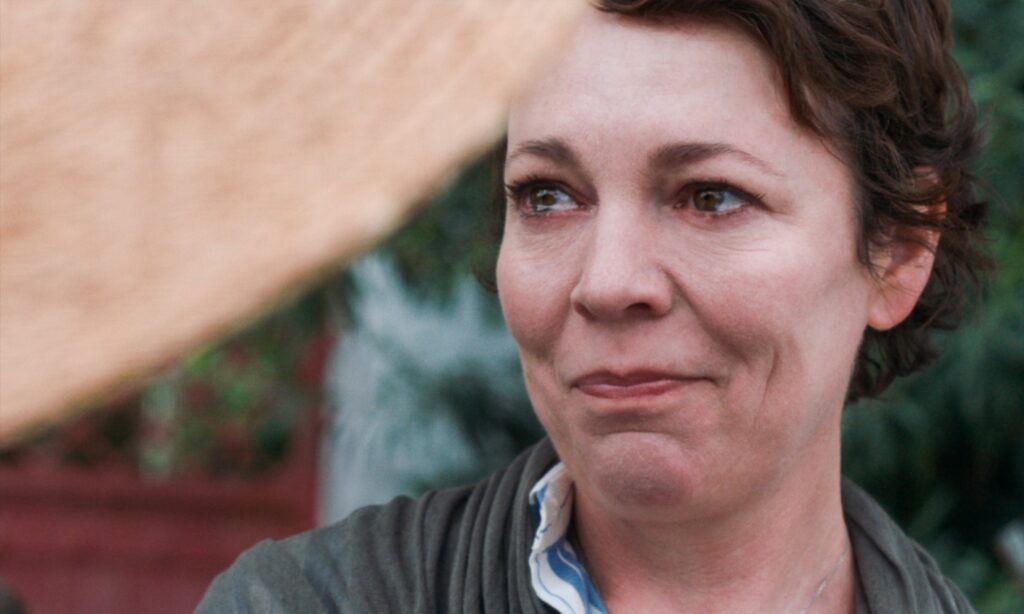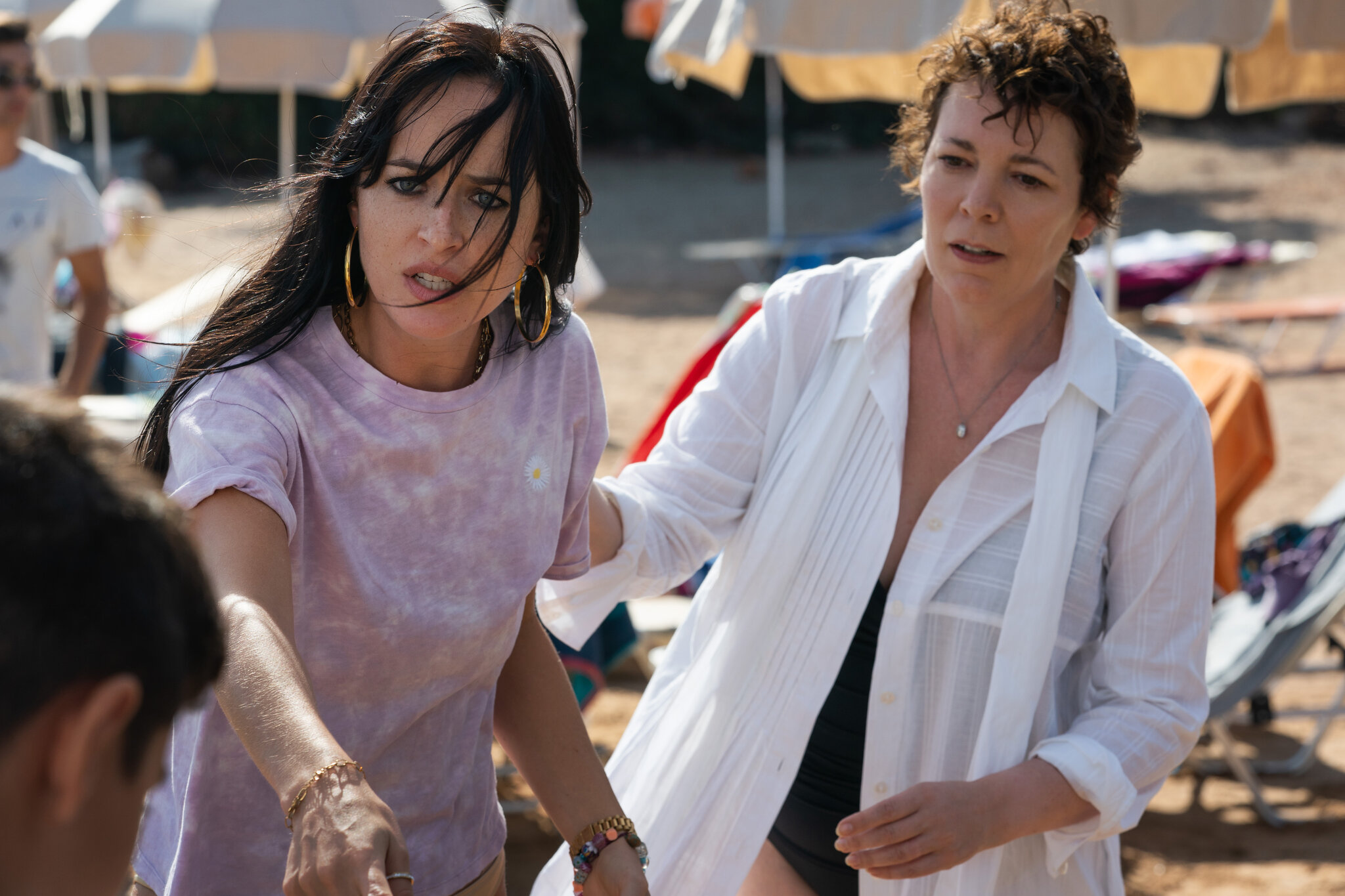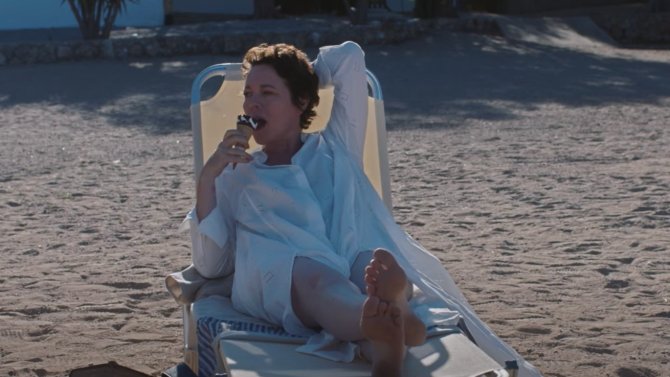Netflix’s The Lost Daughter Explanation is Found. The latest, hard to understand movie ending. Let’s get to it. Spoilers abound… don’t continue if you haven’t seen it yet. And I have zero patience for the stupidity of stock openings. Let’s go.
The Lost Daughter Chronological Walkthrough
Pretty early on, it becomes abundantly clear that we have two separate timelines happening here simultaneously. And to just ease the cognitive load, I’m going to walk you through The Lost Daughter one timeline at a time. Okay? That way, you will see the echos, and mirroring, and implications across timelines more clearly. Both timelines involve Leda, a college professor… but one is played by Olivia Coleman (our elder stateswoman), and the second – earlier timeline – is played by Jessie Buckley (I’m Thinking of Ending Things, Taboo, & The Courier,- which I loved and should really do a write up on). Got it? Younger Leda? Jessie Buckley. Older Leda? Olivia Coleman. Alright let’s do this thing.
Younger Leda is a mother of two children, living in the UK. Leda is studying literature and is also working on translation studies. She is married to a man named Joe (played by Jack Farthing) – and he is also a hardcore academic… but rather than living, eating, breathing literature, he is active as a scientist. And while Leda is pushing hard to break out in her field, she is mostly left to care for the children in their small British apartment. You see? That is the crux of this movie. What? You didn’t sniff it out yet? That’s okay, we’ll come to it soon enough. It’s this balance, or lack there of that seems to be surging to a dramatic head. They are struggling with this lack of balance when this young family chooses to stay with Joe’s professor while on a vacation. And while there, they agree to take in a European backpacking couple. While chatting with them, the couple let’s Leda and Joe know that the backpacking male had left behind his children and his former wife, all in order to take on this new life. A life that made him more “fulfilled.”
Leda is blow away by this epiphanic experience. Wait, WHAT? This is an option? Just dropping everything and bailing out? Huh. Apparently it must be. Who knew? Well, when the couple finished their stay with them, the woman asks to have some of Leda’s writings and this touches Leda deeply. A little while later, Leda is invited to a conference in London, and Leda struggles to make the decision to go – but ultimately she decides it’s the right decision. Setting up the family not only with Joe, but also a babysitter to boot, she feels the family is secure enough for her to skip out for a few days. Then, after arriving in New York her work is praised by another popular and appealing academic, Professor Hardy (played by Peter Sarsgaard) who she falls down the rabbit hole with, and the two academics have an affair together. She even continues the affair after returning to the UK.
Now that Leda has opened this door, Leda begins traveling more and more – and although she ends the affair, she decides she is going to follow their European friend’s lead and peace out, and leave their family behind. She brings the girls presents, and the peals the orange, making a “snake”, after telling her husband she’ll be ending their marriage.
— Pause —
It’s a sad story about a young woman, a mother, who seems to be yearning for an academic life, professional recognition, and her family definitely isn’t providing that for her. I can’t imagine that life was easy for Leda as an aspiring intellectual while also trapped by her children and husband. It’s very sad really. Alright, now, let’s get to the more modern timeline of this movie, alright?
— Unpause —
Modern Leda, she heads over to the Greek isles for a holiday. Early in the movie she is introduced to the keeper of the facilities, Lyle (played by Ed Harris). Soon after her arrival another family comes that include a mother, Nina (played by Dakota Johnson – who, I have to admit, is just getting better and better in my opinion. Definitely didn’t give her much credit earlier on. But loved her in Peanut Butter Falcon etc.) Regardless, Leda becomes enamored. She watches from afar – then as more family arrives, they ask Leda to move chairs and she refuses. Later that evening Callie, one of Nina’s family members gives Leda a cake as sort of a token of peace in order to smooth over the stress. Then Leda invites a worker at the vacation area to come for dinner, where he warns her that she really shouldn’t mess with their family.
When Nina’s youngest goes missing, it’s Leda that swings into the rescue, and finds the young girl. But Elena, the girl, is ultra-upset. Why? Because her doll has gone AWOL. It’s a doll that reminds Leda of the one she had had in the past. And when Leda finds the doll – what does she do? Why, she takes it home of course. Wait, what? Worse, later, when she and Lyle have dinner together, he notices the doll squirreled away, but he doesn’t say anything. Hrmm. Okay. And as the episode with the lost doll escalates, Nina begins putting up lost posters noting that there will be reward if someone discovers the doll.
Then, after cleaning up the doll, she intends to bring it back (“YAY I FOUND IT FOR YOU!!!” sort of a thing) when she discovers that Nina and Will kissing while hiding from Nina’s husband. So she doesn’t return the doll. But as she is scurrying away with the doll, she’s noticed by Toni, which causes her to really awkwardly retreat. Then later, when Leda is at a movie, a pile of boys are being loud, like kids do.The kids make fun of her, but who comes to her rescue? but the Callista family. Unnerved by the stressful encounter, Leda leaves. The next day, Nina runs into Leda at the grocery store and Nina admits to the affair. And in return, Leda admits that she left her own family when her kids were at the ages of six and four.
After a few other strange encounters, Will and Nina ask if Leda will allow them to shack up at her place… because that’s not weird at all. But instead of answering, instead, Leda asks to talk with Nina specifically. Nina arrives for their candid conversation about motherhood and errata, and Nina confesses to Leda that she has been having bouts of depression. To which, Leda responds that the feeling will never pass. Which is when, unwisely, Leda brings out the doll, and tells Nina that she nabbed it… and explains it away by saying, “I’m an unnatural mother.” To which, Nina comes completely unglued and stabs Leda with the hatpin they purchased a few days previously at the market together. She then leaves with the doll and Leda, bleeding, falls asleep on the couch.
Which – brings us to the ending… which, is also, the beginning. I am getting ahead of myself. Leda tosses her suitcases down the stairs, and out the door. She drives away, where we end up at the beginning of the movie, and watch as she crashes her car, and heads out to the beach – flopping on the sand – passing out cold right there on the spot. When she wakes the next morning, she sits there on the beach until her phone rings. Surprisingly, it’s her daughters, who are besides themselves with worry after not hearing from her for so long. I’d heard that the movie and book differed significantly, while still remaining true to the overall pathos of the book, so I had to see for myself. (Thank God for Libby.) Jumping to the end of the book it’s clear that instead of waking up on the beach, she woke up in the hospital… then, later, in her apartment, when her daughters call, her response is? “I’m dead, but I’m fine.” And what is her response in the movie? “I’m alive, actually.” Hrrrmmmm.

Netflix’s The Lost Daughter Explanation is Found
But what does it mean? The ending in both the book and the movie is ambiguous at best. “I’m dead but I’m fine,” and “I’m alive actually.” And while Ferrante’s novel, and the movie, run in parallel tracks to one another, as pointed out above, there are some key differences that might tell us a few things about how we can ascertain what the ending of the movie might mean. Another change to the ending? Remember that “snake” orange peel that she peeled for her daughters prior to ducking out? In the movie, she picks up an unpeeled orange, and she starts peeling it like she did when her daughters were children. Flashback. I mean, the orange? Where did it come from? It appeared out of nowhere. Is she actually dreaming? Unconscious? Dead?
Flip backwards a bit. Let’s come at this problem from a different direction. I think everyone that is trying to dismantle the movie is focusing too much on the screenplay and the movie, instead of the prime mover of the film itself, the book. What is the book about? Not just the ending, but the entirety of the book. So what is it about? “I’m an unnatural mother.” Right. “When my daughters had moved to Toronto, where their father had lived and worked for years, I was embarrassed and amazed to discover that I wasn’t upset; rather, I felt light, as if only then I had definitively brought them into the world.” The book is about a the mind of a woman who regretted becoming a mother. Divorced. Accomplished professor. And perfectionist soloist. Right? She’s the epitome of solo, go-it-alone-ness, personified. Isn’t she? But when the movie starts, it takes her three minutes to become completely consumed by another mother, her family, and her children. Is Leda trying to destroy another mother? Or is she obsessed with what she lost??
There was a section of the book, a disturbingly in your face first person narrative that describes a moment of stark reality inside Leda’s mind: “She was five and immediately in despair: the blood flowed, along with tears of disappointment. I was frightened, yelled at her: I couldn’t leave her alone for a moment, there was never time for myself. I felt that I was suffocating, it seemed to me that I was betraying myself. For long minutes I refused to kiss her wound, the kiss that makes the pain go away. I wanted to teach her that you don’t do that, it’s dangerous, only Mama does it, who is grownup. Mama.” Okay? Maybe we are getting somewhere here. The orange is the key… the peeling was a literary leitmotif – which is just fancy fancy for saying it was a recurring theme throughout the book. A central key to understanding what is going on here. The orange peel was a symbol for how she was suffocating under the weight of her children.
And Nina? What of the young mother? And Leda’s relationship to her? I think in that moment, she was struck by how the young mother had lost the thread of her daughter… completely lost her already. And it’s Leda who manages to find the child, and she does it by reconnecting with a memory of her own daughter. An experience she had had with her own daughter years ago. “I was twenty-five and every other game was over for me. Their father was racing around the world, one opportunity after another. He didn’t even have time to look carefully at what had been copied from his body, at how the reproduction had turned out.”
So let’s step back a second. I think that the movie, and the book, are both about what it means to be a woman in a modern, and complicated, world. It’s about how woman have to double-time it in order to keep pace with men. That opportunities come at twice the effort, and twice the societal cost. I mean, think about how Leda is perceived by the reader and the viewer. We disparage her for abandoning her children, and living so selfishly. But we don’t look down on Leda’s husband for doing exactly the same thing. Why is that?
I know it’s taken me a while to get here – but I think the extra words help set up this one fact… that Ferrante’s book is pointing her microscope at you, not at Leda. I believe that the movie is attempting you to force yourself to consider why we collectively are so harsh on our mothers, and so accepting of our fathers that abandon their children emotionally and spiritually. Yes, I understand that that might seem like a reach – but I won’t be dissuaded here. The Lost Daughter is 100% about Leda’s struggle to truly emancipate herself from society’s expectations, and her own. It’s about our own expectations and harsh critiques of mothers. And it’s about how our father’s should support their spouses in chasing their dreams too. If Joe had supported his wife, and was there for her as she chased after her dreams too, maybe they could have salvaged their family. No? I mean, why is Joe’s dream of scientific achievement so much more important than Leda’s?
But Was Leda Dead at the End??
I don’t think it matters. She could be dead, or not… because she realizes that her daughters were important. She realizes that her family was important. The orange peeling, or Leda’s protection of her children, keeping them safe, is how we end the film. She realizes that she wishes she could have had them both – her dreams, and her family… but society had made that an impossibility. But if I had to guess? I’d guess she was dead. Yup. I’m going with dead… she had given up. Joe, and society, had forced her into a no win situation, and now she was giving up. No? What did you think of the ending? Was she alive?
Edited by: CY


